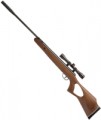Swivels
The presence in the design of the rifle
sling swivels — special loops or staples (usually metal) on which the weapon belt is attached. There are usually two such loops — in the front and back of the weapon. In this case, most often the swivels are installed on the underside of the butt and forearm; this design is universal, it allows both right-handed and left-handed people to use the belt with the same comfort. There are also models with a lateral location of the front swivel — usually on the left side of the forearm, under the right-handed hold; however, nowadays in such rifles it is often possible to rearrange the swivel to the other side. So if the pneumatic is bought for a left-hander and it is planned to equip it with a belt, it will not hurt to clarify the features of the sling swivels separately, however, most likely, their design will not create inconvenience.
Magnification
The degree of magnification provided by the rifle's complete optical sight; for models with variable magnification, the entire adjustment range is indicated, for example 3 – 9x.
For sights of this type in general, see "Aiming Device". And several points depend on the degree of increase at once. On the one hand, a higher magnification allows you to better see small and/or distant targets and facilitates high-precision shooting; on the other hand, it limits the angle of view and significantly affects the cost of the sight, and sometimes also its dimensions and weight. And since air rifles are mostly not designed for long distances, the magnification of complete optics in them usually does not exceed 9x, and one of the most popular options is 4x. However, there are exceptions: in powerful high-end pneumatics, you can find sights with a maximum magnification of 24x and even higher.
Actually, the manufacturer most often selects the magnification of optics for the ballistic characteristics of the rifle. So, when choosing this parameter, it often turns out to be secondary, and it makes sense to focus primarily on the muzzle velocity of the bullet and the firing range for which the weapon is designed — usually, the capabilities of complete optics are quite enough for this. It is also worth mentioning the variable magnification sights mentioned at the beginning, which are quite common nowadays — they are somewhat more complicated and more expensive than fix...ed optics, but they allow you to adjust the magnification to the specifics of the situation.
Lens diameter
The diameter of the front lens (objective) in the optical sight, which is equipped with a rifle.
For sights of this type in general, see "Aiming Device". And the diameter of the lens depends primarily on the amount of light entering the scope. Thus, other things being equal, a larger front lens produces a clearer and brighter image; this is especially noticeable in low light. On the other hand, a larger lens is noticeably more expensive, and it also affects the weight and dimensions of the sight; and in bright daylight, the difference from the “smaller” optics may not be fundamental. In addition, recall that the actual image quality is determined by a number of other factors; as a result, high-end optics with a relatively small front lens may well be more effective than a large low-cost model.
In view of the foregoing, it is worth paying attention to the diameter of the lens in cases where the sight is planned to be used in low light conditions — in a dense forest, at dusk, etc. In this case, it is worth considering not only this indicator, but also other features of the optics (and it is best to focus on practical reviews). If the rifle is bought for recreational use in the daytime in good light, the size of the lens will be a purely reference parameter: in such conditions, almost any optical sight works normally.
Stock material
—
Tree. A classic material used in firearms and then pneumatic weapons since ancient times (in fact, since its inception). Wooden stocks are strong enough on their own, and in modern rifles they are also amenable to special treatment to protect against dampness, temperature changes, etc .; while the rifles have a nice appearance in a classic style. At the same time, the wood is prone to abrasion, scratches easily appear on it, and there is a possibility of cracks. When used in simple conditions, such as periodic "shooting" in the country, this does not matter, however, for example, a wooden stock is not suitable for hunting — at least because it will quickly lose its "presentation". At the same time, this material is also somewhat more expensive and more difficult to process than plastic that is more resistant to “troubles”. Therefore, today the tree is used mainly in pneumatics of the middle and upper price range and is designed for those who are primarily interested in the aesthetics of weapons.
—
Plastic. One of the most popular materials for the manufacture of modern pneumatics. Such stocks are easy to manufacture and inexpensive, while the plastic can be given a rather complex shape without any problems, which, in particular, facilitates the installation of various adjustment systems (see “Cheek Adjustment”, “Butt / Stock Adjustment”). However, its main advantage is practicality: this materia
...l is resistant to impacts, cracks and scratches, comparable in strength to wood (or even superior) and has a small weight. As a result, plastic has become widespread in almost all price ranges.
— Aluminium. A fairly advanced material that combines low weight and high strength. On the other hand, aluminium stocks for classic pneumatics are generally expensive, and therefore are used mainly in high-end professional models (although there are exceptions). But in airsoft rifles that copy real weapons, the situation is somewhat different: there aluminium can be used as a simpler and more affordable alternative to steel (from which gunshot prototypes are made).
